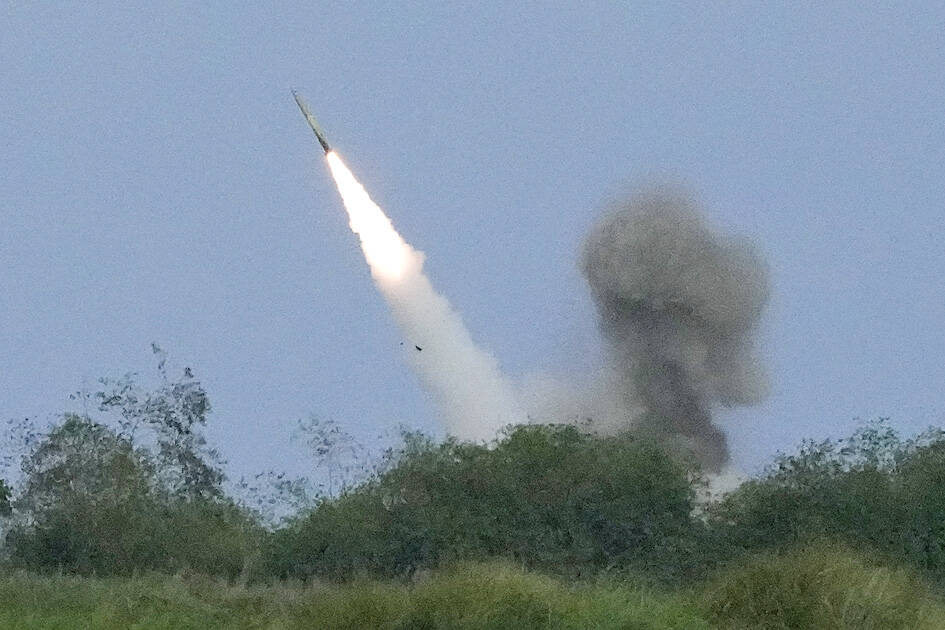The US is to deliver High Mobility Artillery Rocket Systems (HIMARS) to Taiwan a year ahead of schedule, in 2026, with the delivery being expedited in response to rising military tensions across the Strait, the Ministry of National Defense said.
Taiwan agreed to buy 29 HIMARS worth NT$32.5 billion (US$1.06 billion), including an initial order of 11 systems and an additional 18 to replace 40 M109A6 self-propelled howitzers, Lee Shih-Chiang (李世強), director of the ministry’s Department of Strategic Planning, told lawmakers on Thursday.
The first 11 systems are on sechedule, to be delivered next year or in 2025, while the additional 18 are to arrive in 2026, ahead of the planned 2027 or 2028 delivery, Lee said.

Photo: AP
The army’s procurement of rocket artillery systems and ammunition additionally includes 84 Army Tactical Missile Systems (ATACMs) with a nominal range of 300km and 864 Guided Multiple Launch Rocket Systems (GMLRS), with a nominal effective range of 42km, he said.
Separately, retired admiral Huang Shu-kuang (黃曙光), convener of the Presidential Office’s indigenous submarine task force, said yesterday that the nation is on track to put the first indigenous submarine to sea in September.
He made the remark at a National Taiwan Ocean University event discussing the nation’s shipbuilding programs.
Submarines are crucial for Taiwanese security, as the nation’s geostrategic position on the first island chain is better suited for a defensive posture based on submarine warfare than strength-on-strength surface action, Huang said.
The nation’s security strategy should involve improving the capability of the armed forces and banding with other democratic nations to form a defensive alliance in the Indo-Pacific region, he said.
Taiwan began efforts to obtain submarines under former president Lee Teng-hui’s (李登輝) administration, but the first attempts were unsuccessful due to diplomatic constraints, Huang said.
The indigenous defense submarine program was proposed near the end of former president Ma Ying-jeou’s (馬英九) term and continued by President Tsai Ing-wen (蔡英文), he said.
Precision strike missiles, submarines, undersea vessels, missile-firing boats, and mines and minelayers must be developed to defend the maritime logistical lifelines the nation depends on for gas and strategic resources, Huang said.
The university is at the forefront of the nation’s bid to develop AI-based autonomous uncrewed undersea vessels, and a prototype has successfully completed an one-hour undersea voyage, university president Cheng Ying-yao (鄭英耀) said.

The CIA has a message for Chinese government officials worried about their place in Chinese President Xi Jinping’s (習近平) government: Come work with us. The agency released two Mandarin-language videos on social media on Thursday inviting disgruntled officials to contact the CIA. The recruitment videos posted on YouTube and X racked up more than 5 million views combined in their first day. The outreach comes as CIA Director John Ratcliffe has vowed to boost the agency’s use of intelligence from human sources and its focus on China, which has recently targeted US officials with its own espionage operations. The videos are “aimed at

STEADFAST FRIEND: The bills encourage increased Taiwan-US engagement and address China’s distortion of UN Resolution 2758 to isolate Taiwan internationally The Presidential Office yesterday thanked the US House of Representatives for unanimously passing two Taiwan-related bills highlighting its solid support for Taiwan’s democracy and global participation, and for deepening bilateral relations. One of the bills, the Taiwan Assurance Implementation Act, requires the US Department of State to periodically review its guidelines for engagement with Taiwan, and report to the US Congress on the guidelines and plans to lift self-imposed limitations on US-Taiwan engagement. The other bill is the Taiwan International Solidarity Act, which clarifies that UN Resolution 2758 does not address the issue of the representation of Taiwan or its people in

US Indo-Pacific Commander Admiral Samuel Paparo on Friday expressed concern over the rate at which China is diversifying its military exercises, the Financial Times (FT) reported on Saturday. “The rates of change on the depth and breadth of their exercises is the one non-linear effect that I’ve seen in the last year that wakes me up at night or keeps me up at night,” Paparo was quoted by FT as saying while attending the annual Sedona Forum at the McCain Institute in Arizona. Paparo also expressed concern over the speed with which China was expanding its military. While the US

SHIFT: Taiwan’s better-than-expected first-quarter GDP and signs of weakness in the US have driven global capital back to emerging markets, the central bank head said The central bank yesterday blamed market speculation for the steep rise in the local currency, and urged exporters and financial institutions to stay calm and stop panic sell-offs to avoid hurting their own profitability. The nation’s top monetary policymaker said that it would step in, if necessary, to maintain order and stability in the foreign exchange market. The remarks came as the NT dollar yesterday closed up NT$0.919 to NT$30.145 against the US dollar in Taipei trading, after rising as high as NT$29.59 in intraday trading. The local currency has surged 5.85 percent against the greenback over the past two sessions, central